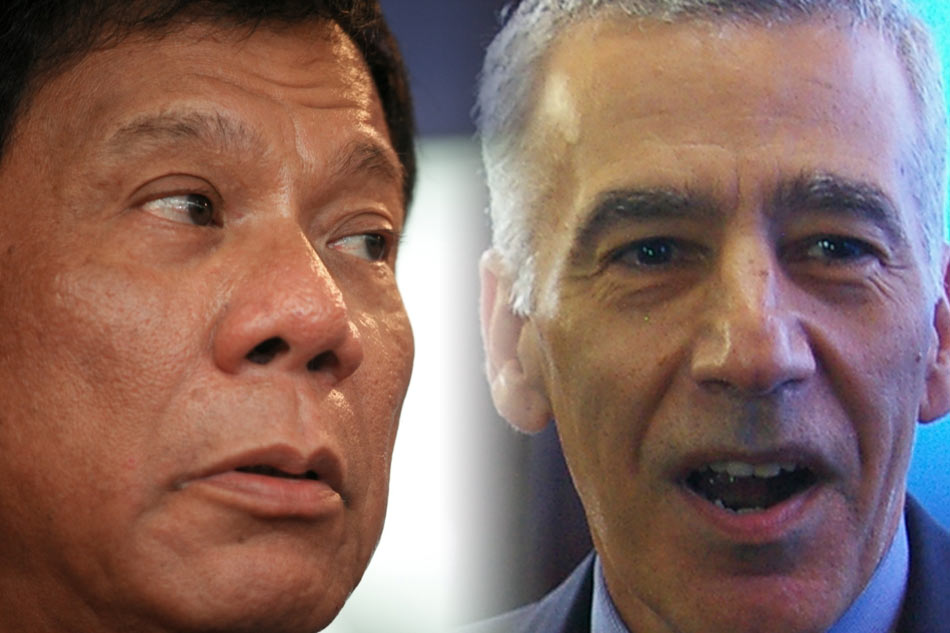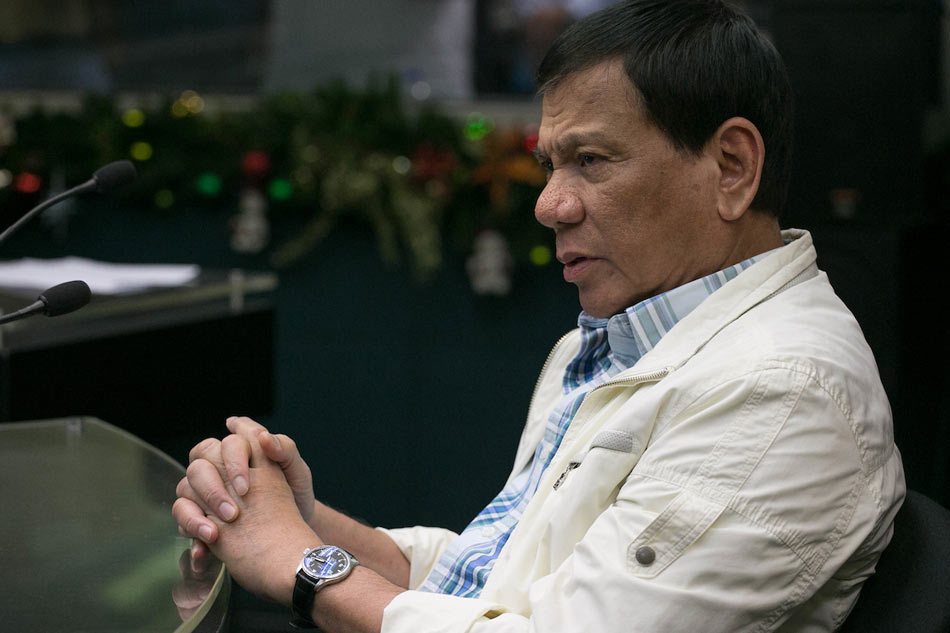No U.S. intrusion on missing 'fortune hunter': Goldberg | ABS-CBN
ADVERTISEMENT

Welcome, Kapamilya! We use cookies to improve your browsing experience. Continuing to use this site means you agree to our use of cookies. Tell me more!
No U.S. intrusion on missing 'fortune hunter': Goldberg
No U.S. intrusion on missing 'fortune hunter': Goldberg
David Dizon,
ABS-CBN News
Published Oct 25, 2016 09:46 PM PHT
Outgoing U.S. Ambassador to the Philippines Philip Goldberg denied Tuesday there was American intrusion in the case of bombing suspect Michael Meiring, who was allegedly spirited away by American forces after an explosion in Davao City in 2002.
Outgoing U.S. Ambassador to the Philippines Philip Goldberg denied Tuesday there was American intrusion in the case of bombing suspect Michael Meiring, who was allegedly spirited away by American forces after an explosion in Davao City in 2002.
Speaking to ANC's Headstart, Goldberg described Meiring as a U.S. citizen and "fortune hunter" with "unclear motives."
Speaking to ANC's Headstart, Goldberg described Meiring as a U.S. citizen and "fortune hunter" with "unclear motives."
A New York Times article said Meiring was charged with possession of explosives after an explosive tore through his room at the Evergreen Hotel in 2002.
A New York Times article said Meiring was charged with possession of explosives after an explosive tore through his room at the Evergreen Hotel in 2002.
"My understanding on what happened was an American citizen, his motives still a bit unclear...we have American citizens who are around the world who have nothing to do with the United States government who go off on their own. They do strange things. In this case, maybe looking for a -- as a fortune hunter or -- and he blew himself up literally in his hotel room. Lost two legs, one leg, I'm not sure," the ambassador said in an interview with Headstart host Karen Davila.
"My understanding on what happened was an American citizen, his motives still a bit unclear...we have American citizens who are around the world who have nothing to do with the United States government who go off on their own. They do strange things. In this case, maybe looking for a -- as a fortune hunter or -- and he blew himself up literally in his hotel room. Lost two legs, one leg, I'm not sure," the ambassador said in an interview with Headstart host Karen Davila.
ADVERTISEMENT
Goldberg said that after the explosion, Meiring was transported by international air ambulance out of the country for further treatment.
Goldberg said that after the explosion, Meiring was transported by international air ambulance out of the country for further treatment.
"There was no stop order on him at the time, that's what our records show. He was transported by international air ambulance with no stop order, no arrest order, for further treatment because his family wanted to make sure his life was saved and wanted advanced medical care," he said.
"There was no stop order on him at the time, that's what our records show. He was transported by international air ambulance with no stop order, no arrest order, for further treatment because his family wanted to make sure his life was saved and wanted advanced medical care," he said.
The ambassador said he hopes the Meiring case would not be the "be-all and end-all" of the relationship between the Philippines and United States. He said the U.S. government can only provide information about the Meiring case.
The ambassador said he hopes the Meiring case would not be the "be-all and end-all" of the relationship between the Philippines and United States. He said the U.S. government can only provide information about the Meiring case.
"I hope that it's accepted and we can then go on to serious matters about government to government relations," he said.
"I hope that it's accepted and we can then go on to serious matters about government to government relations," he said.
He also said he understands why the Meiring case can be seen as a sensitive point for Duterte.
He also said he understands why the Meiring case can be seen as a sensitive point for Duterte.
"There is a great sensitivity about sovereignty and about any intrusion of another government, especially the United States. My understanding at looking at the record is that is not what happened but again, if there is contrary information we are open to receiving it," he said.
"There is a great sensitivity about sovereignty and about any intrusion of another government, especially the United States. My understanding at looking at the record is that is not what happened but again, if there is contrary information we are open to receiving it," he said.
The New York Times article earlier said Meiring managed to flee the Philippines despite the severe injuries he sustained in the 2002 blast.
The New York Times article earlier said Meiring managed to flee the Philippines despite the severe injuries he sustained in the 2002 blast.
It quoted Philippine officials as saying that "men waving F.B.I. badges had taken [Meiring] in the dark of night and flown him out of the country without their permission."
It quoted Philippine officials as saying that "men waving F.B.I. badges had taken [Meiring] in the dark of night and flown him out of the country without their permission."
Allies of President Duterte have earlier pointed to the Meiring case as the possible root cause for the President's hostility towards the U.S.
Allies of President Duterte have earlier pointed to the Meiring case as the possible root cause for the President's hostility towards the U.S.
Defense Secretary Delfin Lorenzana earlier told ANC that the Meiring case "still rankles President Duterte to this day."
Defense Secretary Delfin Lorenzana earlier told ANC that the Meiring case "still rankles President Duterte to this day."
"I think that still rankles him to this day. That was a long time ago—maybe five years ago—but he still mentions it once in a while that he just feels hurt that the United States can come in, unannounced in his city, grab a person that is being under investigation by his police, and bring him out [of the country]," he said.
"I think that still rankles him to this day. That was a long time ago—maybe five years ago—but he still mentions it once in a while that he just feels hurt that the United States can come in, unannounced in his city, grab a person that is being under investigation by his police, and bring him out [of the country]," he said.
Lorenzana said, what he has heard was that "there was actually go-signal from the Palace," under then-President Gloria Macapagal-Arroyo, for American forces "to go in."
Lorenzana said, what he has heard was that "there was actually go-signal from the Palace," under then-President Gloria Macapagal-Arroyo, for American forces "to go in."
"[Duterte] said, 'had they just informed me, there’s nothing wrong.' He just feels hurt and I think that’s one of the things," he said.
"[Duterte] said, 'had they just informed me, there’s nothing wrong.' He just feels hurt and I think that’s one of the things," he said.
Last week, Duterte accused the United States of encroaching on the Philippines' sovereignty by deploying an alleged spy in Davao City
Last week, Duterte accused the United States of encroaching on the Philippines' sovereignty by deploying an alleged spy in Davao City
Describing it as a "Batman and Robin" mystery, he said Meiring was "shanghaied", first to Singapore and then the U.S., by alleged FBI agents a day after the blast.
Describing it as a "Batman and Robin" mystery, he said Meiring was "shanghaied", first to Singapore and then the U.S., by alleged FBI agents a day after the blast.
"Binastos tayo ng Amerika (We were insulted by America)," he said, adding that the U.S. never apologized for what happened.
"Binastos tayo ng Amerika (We were insulted by America)," he said, adding that the U.S. never apologized for what happened.
He also claimed that during the 2016 presidential campaign, an alleged CIA agent approached him and asked if it was possible to forget the Meiring case.
He also claimed that during the 2016 presidential campaign, an alleged CIA agent approached him and asked if it was possible to forget the Meiring case.
"These were his exact words. 'Mayor, can we let this thing pass? Forget it,'" he recalled. He added that he refused the request since the U.S. never explained what happened to Meiring.
"These were his exact words. 'Mayor, can we let this thing pass? Forget it,'" he recalled. He added that he refused the request since the U.S. never explained what happened to Meiring.
ADVERTISEMENT
ADVERTISEMENT




